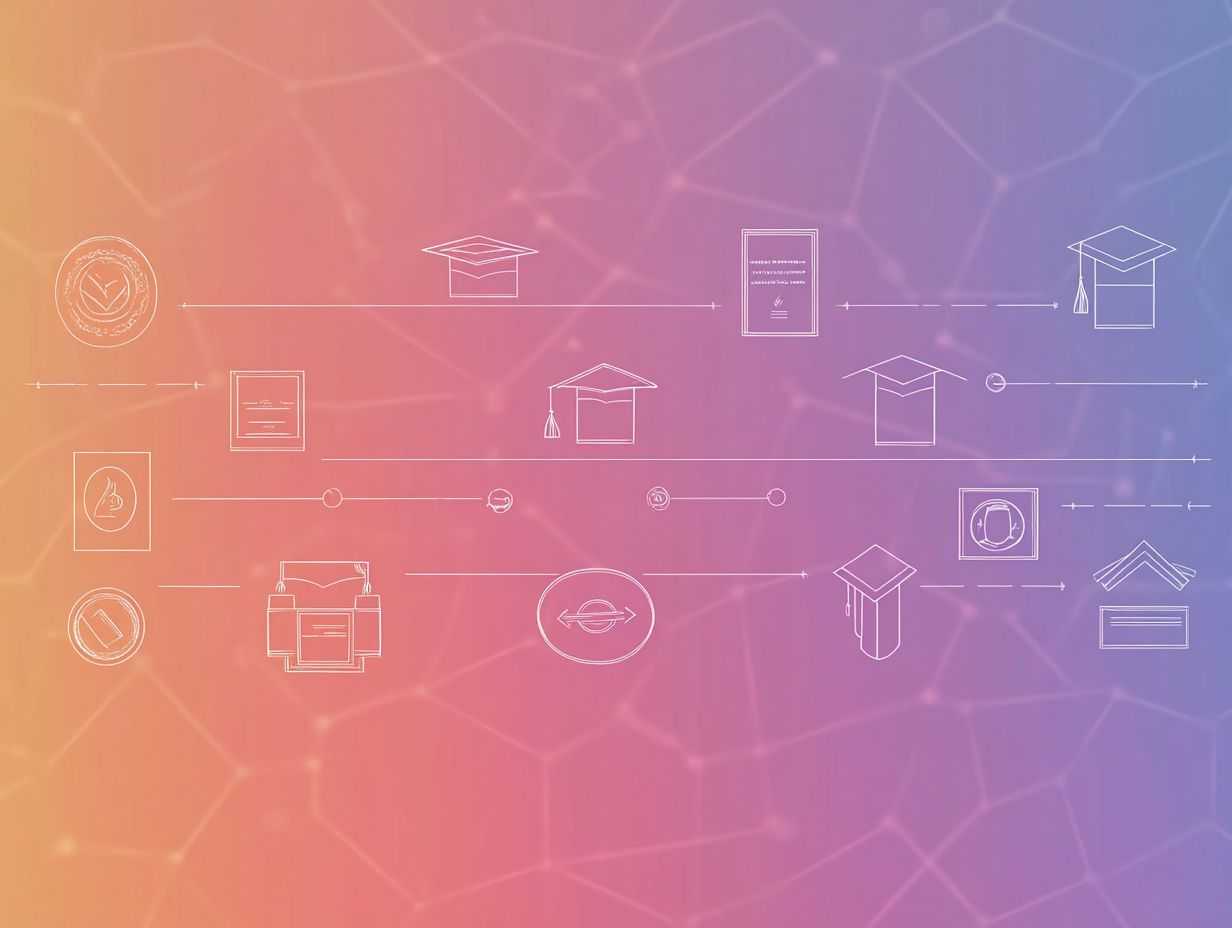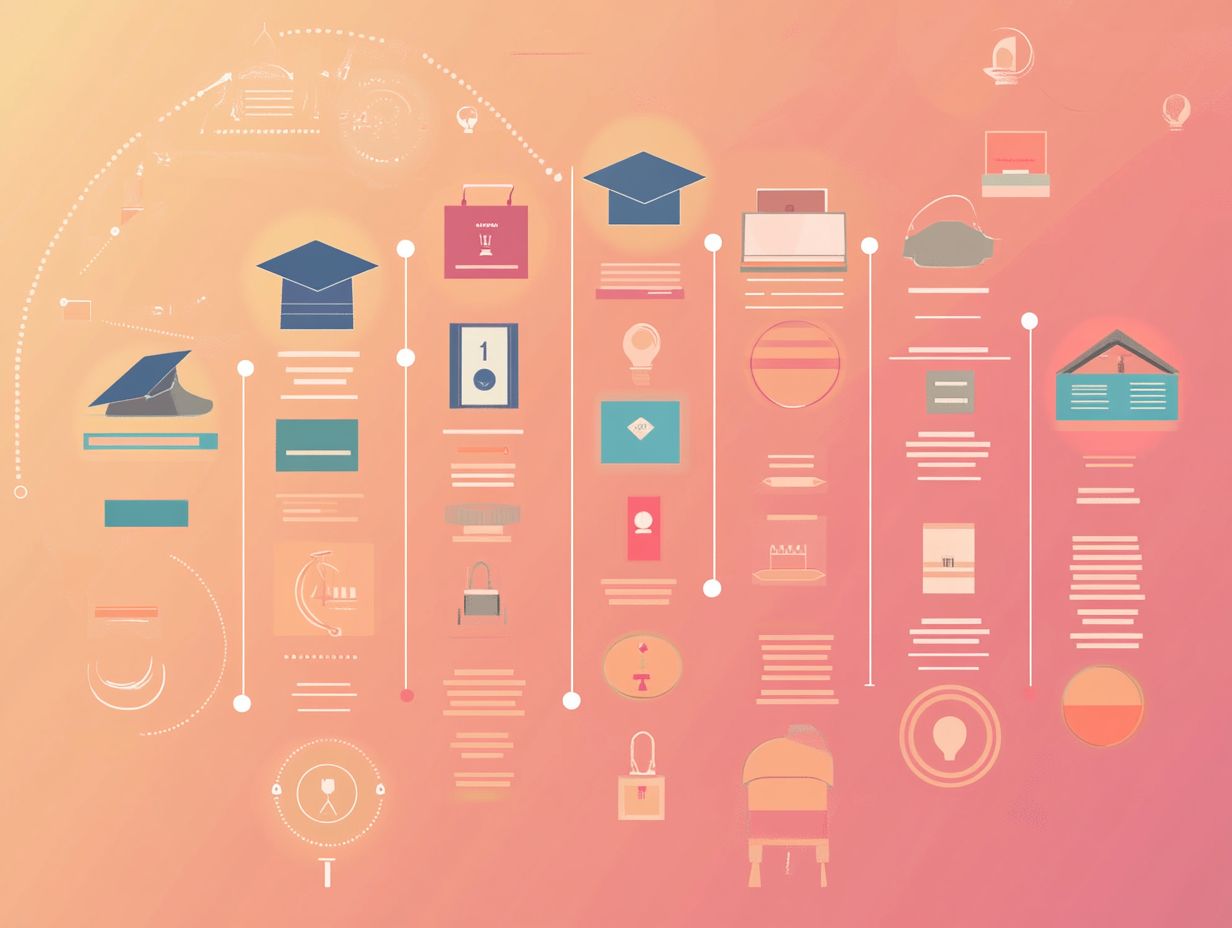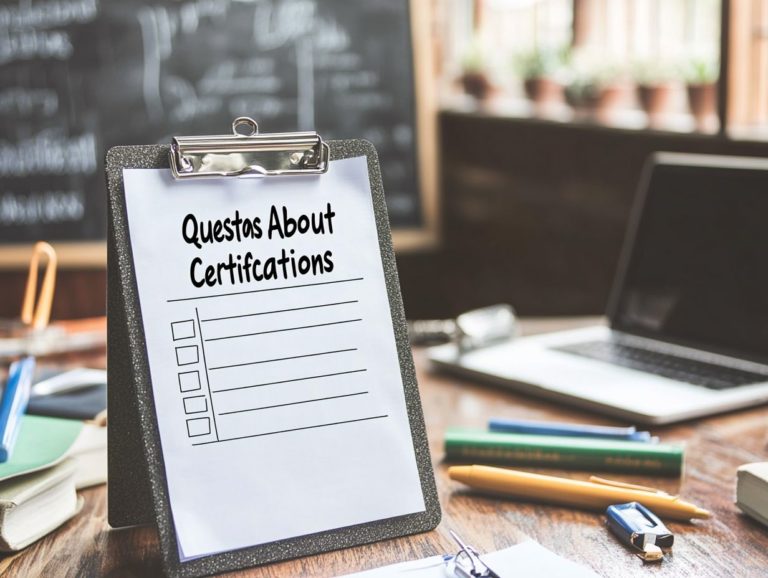The Evolution of Educational Certifications Over the Years
Educational certifications have a fascinating history that dates back to the 19th century. They have long been pivotal in shaping both academic and professional landscapes.
From their early origins to the diverse array we encounter today, these certifications signify not just competence but also a deep commitment to various fields.
This exploration delves into the history of educational certifications, their significant impact on career opportunities, and the emerging trends shaped by technology.
Join us as we explore the evolution of certifications and discover valuable insights that can impact your career today!
Contents
- Key Takeaways:
- Definition and Purpose
- The History of Educational Certifications
- Types of Educational Certifications
- The Role of Educational Certifications in Today’s World
- Future Trends in Educational Certifications
- Frequently Asked Questions
- 1. How have educational certifications evolved over the years?
- 2. What were the traditional forms of educational certifications?
- 3. How have digital technologies impacted the evolution of educational certifications?
- 4. What is the current trend in educational certifications?
- 5. How has the recognition of educational certifications changed over the years?
- 6. What are the benefits of the evolution of educational certifications?
Key Takeaways:

- Educational certifications have changed significantly, adapting to our modern needs.
- They play a crucial role in today’s world, influencing career opportunities and promoting lifelong learning through continuing education and recertification.
- With the rise of technology and online learning, the future of educational certifications is headed toward more accessible and personalized options for individuals.
Definition and Purpose
The definition and purpose of educational certifications are fundamental in shaping your teaching career. They ensure that you possess the essential knowledge and skills to deliver effective classroom instruction.
Educational certifications, such as teacher certification and digital credentials, act as tangible proof of your qualifications, aligning with the rigorous standards established by various educational institutions.
These certifications not only validate your expertise in teaching methods but also significantly contribute to enhancing academic achievement and upholding high-quality teaching standards across public education systems.
The History of Educational Certifications
The history of educational certifications is rooted in the 19th-century Common Schools movement, led by visionary reformers like Horace Mann. He championed a structured approach to teacher education that laid the groundwork for what we see today, including a focus on understanding the requirements for educational certifications.
As time progressed, the evolution of teacher certification reflected broader trends in public education, adapting to shifting societal values and the increasing complexities of educational theory and practice, including the role of educational certifications in lifelong learning.
Institutions like NYU Steinhardt have been pivotal in shaping the standards and methodologies that now define teacher certifications, influencing the future of education as we know it.
Early Forms of Certification
In the early days of teacher education, certifications were largely informal, often based on educational credentials that indicated a teacher’s grasp of the subjects they taught.
The emergence of Common Schools was a game changer, creating a pressing need for more formalized pathways for teacher preparation and credentialing. This evolution laid the groundwork for teaching expertise to become a vital aspect of educational qualifications.
This shift recognized that teaching transcended mere content knowledge; it demanded specialized skills and an understanding of how to effectively impart that knowledge to diverse learners.
As the educational landscape broadened, it became clear that a structured approach to teacher training was crucial for enhancing educational outcomes. This historical backdrop highlights the increasing significance of formal teacher preparation programs, which have now evolved to include teaching methodologies, classroom management techniques, and child psychology, ensuring educators are fully equipped to address the varied needs of their students.
Changes and Developments over Time
Over time, the landscape of teacher certification has transformed significantly. This evolution responds to the demands of public education and is influenced by insights into the global demand for educational certifications and the introduction of formal certification standards.
Educational institutions have adapted their programs to align with these standards. They incorporate assessments like the Praxis, which evaluates your readiness for the classroom.
This evolution reflects ongoing efforts by education reformers to enhance teaching effectiveness and improve student performance across various educational systems.
As a result, many states have developed frameworks that emphasize standardized testing and promote comprehensive training programs to sharpen your teaching skills.
These frameworks ensure you are proficient in your subject matter and equipped to foster inclusive and engaging learning environments.
The rise of alternative certification pathways has created new opportunities for professionals from diverse backgrounds to enter the teaching workforce, broadening the talent pool and enriching the educational experience for students.
This multi-faceted approach underscores the importance of ongoing evaluation and adaptation in crafting a more effective and responsive teacher certification process.
Types of Educational Certifications

Educational certifications can be divided into two primary categories: academic certifications and professional certifications. Each fulfills unique roles in the educational realm.
Academic certifications are usually conferred by higher education institutions. They validate a teacher’s educational background and qualifications.
In contrast, professional certifications such as specific teacher certifications highlight specialized skills and preparedness for the classroom. They often require advanced degrees.
Academic Certifications
Academic certifications are awarded by higher education institutions upon successful completion of educational programs. They validate your academic achievements and readiness for the teaching profession.
These certifications are vital for establishing a standardized measure of the knowledge and skills you must demonstrate as an aspiring educator.
This process typically involves a comprehensive array of coursework that delves into teaching methods, classroom management strategies, and subject-specific content. All are essential components that enhance your effectiveness in the classroom.
Practical experiences, such as student teaching placements, allow you to apply your theoretical knowledge in real-world settings. This solidifies your readiness to inspire and educate students.
In this ever-evolving educational landscape, these certifications elevate your credentials and ensure you have the necessary tools to foster learning in diverse environments.
Professional Certifications
Professional certifications serve as formal acknowledgment of your skills and adherence to established standards. They function as a vital pathway for advancing your career in education and enhancing teacher quality.
These certifications validate your expertise and underscore your commitment to ongoing professional development. Today s education scene is buzzing with competition, and securing a certification can open doors to new career advancement opportunities, elevate your teaching practice, and potentially increase your earning potential.
The requirements for these certifications often involve rigorous training, coursework, and assessments. This ensures you are well-equipped with the latest methodologies and knowledge.
By pursuing such credentials, you contribute to a culture of excellence and continuous improvement, ultimately benefiting both your students and the broader educational community.
The Role of Educational Certifications in Today’s World
In today s fast-paced education landscape, educational certifications are essential for elevating teaching effectiveness and advancing career prospects for educators like you.
With the growing focus on digital transformation, digital certificates and credentials have emerged as a modern solution for verifying educational qualifications. This approach bolsters your credibility as a teaching professional and positions you prominently in the evolving field of education.
Explore your certification options today and connect with educational programs to enhance your career!
Impact on Career Opportunities
The impact of educational certifications on your career opportunities as an educator is profound. Getting the right teacher certification opens doors to advanced roles within educational institutions and enhances your prospects for career advancement.
Specialized certifications, such as those in special education or bilingual instruction, significantly broaden your career path.
For instance, if you become certified in special education, you may find yourself not only teaching in standard classrooms but also stepping into leadership roles in curriculum design or serving as an educational consultant. Pursuing a certification in educational technology positions you as an invaluable resource for integrating tech tools into classroom settings.
These additional qualifications do more than just boost your employability; they equip you with the skills necessary to navigate the ever-evolving educational landscape. This leads to job satisfaction and professional growth, ensuring you stay at the forefront of your field.
Continuing Education and Recertification

Ongoing professional development is essential for maintaining teacher quality and ensuring alignment with the ever-evolving landscape of teaching methods and educational technologies.
This commitment enriches the overall learning environment in your classroom.
Jump into various professional development activities, which may include:
- Workshops.
- Online courses.
- Participation in educational conferences.
These opportunities not only enhance your skill set but also cultivate collaboration among fellow educators. As states and districts establish recertification processes, they often require you to accumulate a specific number of professional development hours within a designated timeframe.
Engage in these programs to tackle diverse student needs effectively!
Future Trends in Educational Certifications
Future trends in educational certifications are significantly influenced by technological advancements, making way for online certifications and digital credentials that simplify the verification of educational qualifications.
Blockchain technology, a system that securely records transactions, holds the potential to enhance the authenticity and security of these credentials, offering a more streamlined approach for educational institutions and employers to validate the qualifications of teacher candidates.
Technological Advancements and Online Certifications
Technological advancements have transformed the world of online certifications, enabling educational programs to leverage digital innovation for more accessible and flexible learning pathways tailored for teacher candidates.
This evolution not only opens up a diverse array of subjects and specialties but also fosters inclusivity, inviting individuals from various backgrounds to participate in teacher education.
While the advantages of convenience and expanded reach are clear, challenges persist particularly regarding skills verification. Showcase your skills to stand out in today s competitive job market!
As institutions navigate this ever-changing digital landscape, it s vital for them to prioritize the development of robust assessment methods. By doing so, they can uphold quality standards, ultimately shaping the future of teacher education in a way that harmonizes innovation with credibility.
Frequently Asked Questions
1. How have educational certifications evolved over the years?
Over the years, educational certifications have evolved from being a measure of knowledge to a comprehensive assessment of skills and competencies. Understanding the impact of technology on educational certifications reveals how they have become more diverse and specialized to cater to the changing demands of industries and job roles.
2. What were the traditional forms of educational certifications?

Traditional forms of educational certifications include diplomas, degrees, and certificates from accredited institutions. These were based on completing a curriculum and passing exams.
3. How have digital technologies impacted the evolution of educational certifications?
Digital technologies have greatly influenced educational certifications. They have made learning more accessible, flexible, and personalized.
Online courses, digital badges, and micro-credentials, which are small, focused certifications, are now popular options available through virtual learning platforms.
4. What is the current trend in educational certifications?
Today, educational certifications focus on competency and skills. This shift emphasizes proving practical skills over merely passing tests.
Many of these certifications are stackable, allowing individuals to combine them for continuous learning and career advancement.
5. How has the recognition of educational certifications changed over the years?
In the past, educational certifications were mainly recognized within specific countries or regions. However, advancements in technology have led to greater recognition of certifications from around the globe.
6. What are the benefits of the evolution of educational certifications?
The evolution of educational certifications brings numerous benefits. Imagine having the power to tailor your education! This shift, highlighted in the future of educational certifications in a digital world, means increased access to education and more personalized learning options.
Furthermore, the focus on practical skills makes individuals more competitive in today’s job market. Explore these innovative options today to boost your career!






